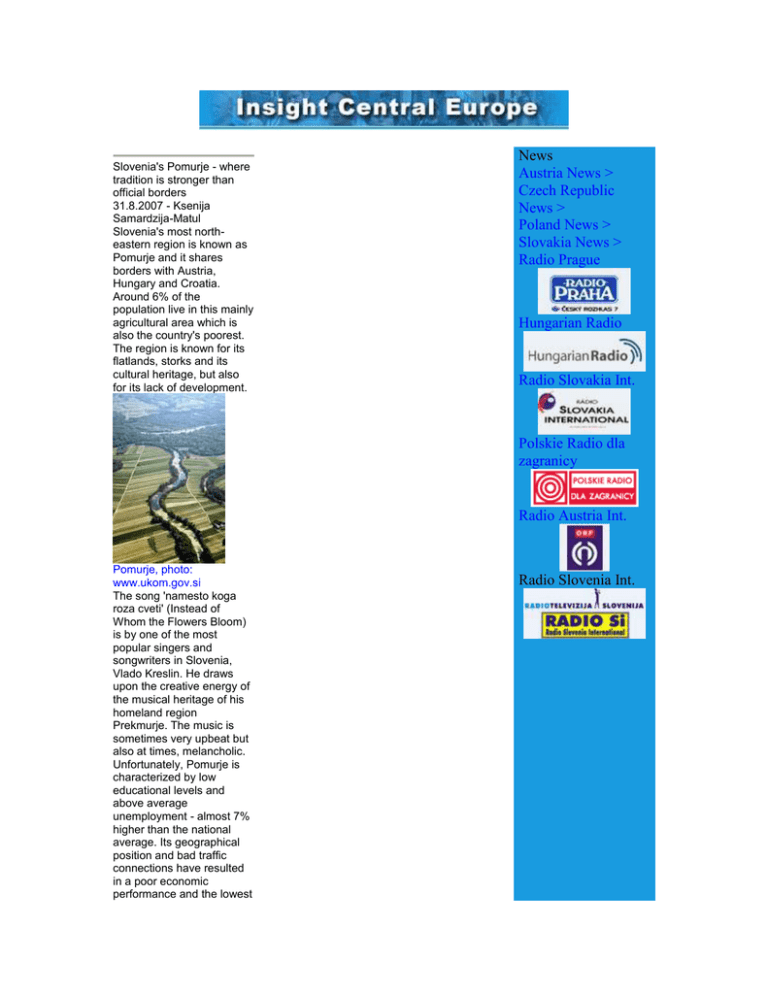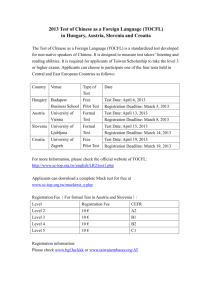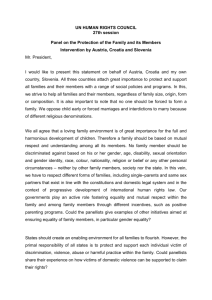
Slovenia's Pomurje - where
tradition is stronger than
official borders
31.8.2007 - Ksenija
Samardzija-Matul
Slovenia's most northeastern region is known as
Pomurje and it shares
borders with Austria,
Hungary and Croatia.
Around 6% of the
population live in this mainly
agricultural area which is
also the country's poorest.
The region is known for its
flatlands, storks and its
cultural heritage, but also
for its lack of development.
News
Austria News >
Czech Republic
News >
Poland News >
Slovakia News >
Radio Prague
Hungarian Radio
Radio Slovakia Int.
Polskie Radio dla
zagranicy
Radio Austria Int.
Pomurje, photo:
www.ukom.gov.si
The song 'namesto koga
roza cveti' (Instead of
Whom the Flowers Bloom)
is by one of the most
popular singers and
songwriters in Slovenia,
Vlado Kreslin. He draws
upon the creative energy of
the musical heritage of his
homeland region
Prekmurje. The music is
sometimes very upbeat but
also at times, melancholic.
Unfortunately, Pomurje is
characterized by low
educational levels and
above average
unemployment - almost 7%
higher than the national
average. Its geographical
position and bad traffic
connections have resulted
in a poor economic
performance and the lowest
Radio Slovenia Int.
GDP per capita is Slovenia
- approximately 9000
Euros. The roots of this
situation can be found in
the history of the region.
Franc Kuzmic of the
regional museum in Murska
Sobota:
"Between the two World
Wars
the
region
experienced an economic
crisis and many had to
leave their homes, either as
emigrants or as seasonal
workers, who returned to
their homes at the end of
the season. Little was
invested in the region after
the war and so Prekmurje
lagged behind, which then
again led to the emigration
of its inhabitants after World
War II and in the 60s, the
majority
emigrated
to
Germany."
Mr. Kuzmic also stressed
that the region was always
less developed compared
to other parts of Slovenia
and
many
intellectuals
never returned home after
having left for better
education and better jobs.
The high unemployment
rate today can be explained
by the fact that although
there was industry in the
region it was mostly the
agricultural
and
food
processing industry, which
is collapsing. Other areas
need to be developed and
investments are necessary,
e.g.
in
tourism.
The
inhabitants of the Pomurje
region are looking for other
ways to improve their living
standards, either with the
help
of
the
Slovene
government
or
with
European funds. Romeo
Varga of the Regional
development agency Mura
explains:
"We are trying to reach an
agreement with the national
government
to
receive
some
positive
discrimination
for
the
Pomurje region. We were
more or less unsuccessful
but there is an interesting
movement in this direction.
For instance we have in the
Pomurje region some 40%
of VAT decreases when
investment is done into
research and development."
The water supply system in
the region for example will
be funded by an EU
cohesion
fund.
Romeo
Varga stresses that regional
institutions have been quite
successful receiving cofinancing from different
funds directly from the
European
Commission.
According to him, other
areas of the Pomurje region
where support is needed
are:
"Tourism,
employment,
there is also research and
development, there is also
support for enterprises in
the region, we have funds
for the improvement of the
environment
and
infrastructure."
But receiving money from
different funds alone will not
solve the problems. There
is something else that Mr.
Varga feels is missing:
"What we are lacking are
interesting
initiatives,
creativeness of the region
and we can also say that
we
are
lacking
of
management knowledge in
the region and probably this
is the most important topic
we want to work for."
Prekmurje
may
be
Slovenia's poorest region
but as Vlado Kreslin proves
- its rich in cultural tradition.
If some of the initiatives
supported by the EU and
the government in Ljubljana
prove successful this part of
the country should come
closer to the rest of
Slovenia.
Radio Prague, Vinohradska 12, 120 99 Prague 2, Czech Republic tel: +420-2-2155
2931-7, fax: +420-2-2155 2903
Copyright © 2004 Radio Prague, All Rights Reserved
E-mail: cr@radio.cz







